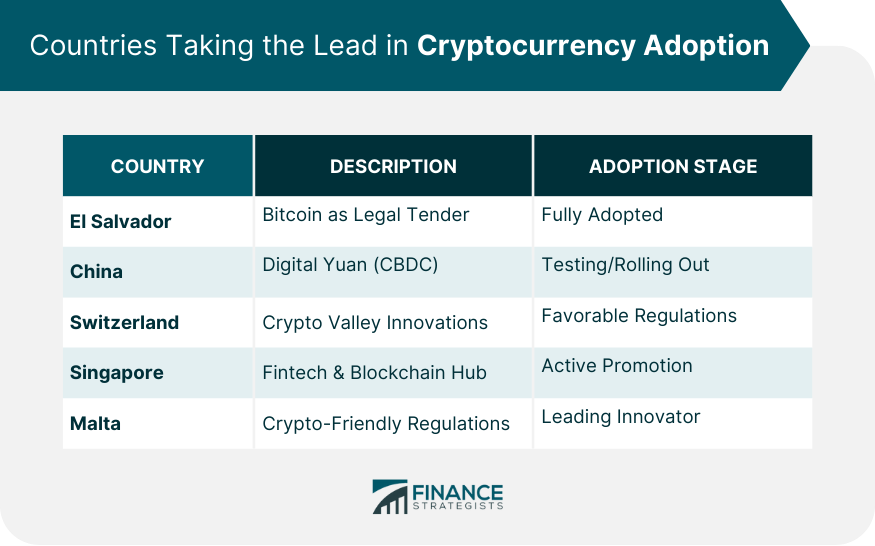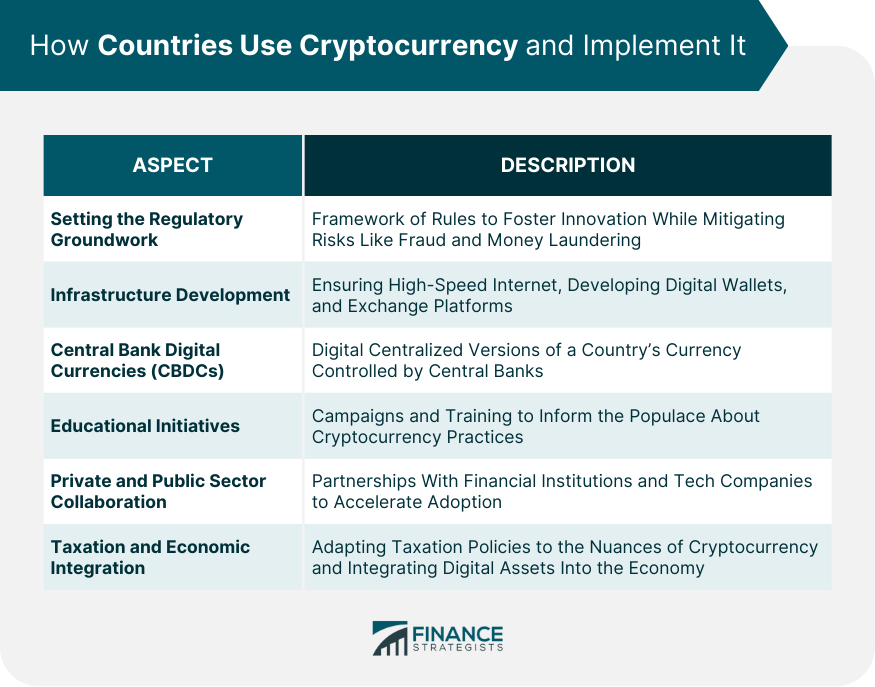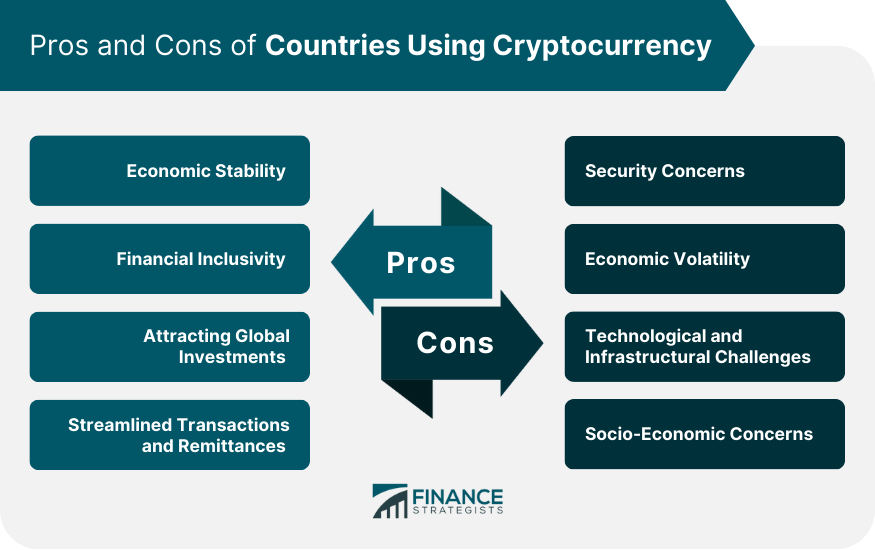Countries using cryptocurrency are tapping into the digital financial evolution, positioning themselves at the forefront of technological innovation. These nations are either fully integrating digital currencies into their financial systems or exploring frameworks for their adoption. Motivations vary: from seeking economic stability, bypassing sanctions, and achieving financial inclusivity for the unbanked population, to attracting global tech-centric investments. However, the journey isn't without challenges. Nations grapple with regulatory concerns, security issues, and the volatile nature of digital assets. Furthermore, infrastructural requirements and educating the masses are essential for seamless adoption. As the digital currency landscape continues to evolve, the decisions made by countries today will significantly influence the global financial paradigm of tomorrow. The global financial landscape has witnessed a transformative shift with the rise of cryptocurrencies. These digital currencies, initially relegated to niche communities, have found mainstream prominence. Several countries have identified the potential of this technology and are taking strides to embrace it. El Salvador made headlines by becoming the first country to recognize Bitcoin as legal tender. This historic decision was aimed at boosting remittances and fostering financial inclusivity, allowing every merchant in the country to accept Bitcoin as payment. China, while being skeptical about decentralized cryptocurrencies, has been testing and rolling out its Central Bank Digital Currency (CBDC), the Digital Yuan. This state-backed digital currency is set to revolutionize the digital payment landscape in the country and potentially beyond. Switzerland's city of Zug, often termed the "Crypto Valley," has been a hotspot for cryptocurrency innovations and startups. The Swiss government's positive stance on digital assets and the establishment of regulations fostering growth has made Switzerland a global leader in the crypto arena. Singapore has positioned itself as a fintech and blockchain hub in Asia. The country's regulatory body, the Monetary Authority of Singapore (MAS), has laid out clear guidelines and licenses for cryptocurrency exchanges, attracting businesses and investors alike. Malta's proactive approach to creating crypto-friendly regulations has earned it the title of "The Blockchain Island." The Mediterranean nation has adopted a holistic approach, nurturing both technological development and investor protection. The integration of cryptocurrency into national financial systems is a multifaceted endeavor. Nations keen on leveraging the advantages of digital assets often face a host of challenges and considerations. Here’s a deep dive into how countries go about this intricate process. Before any practical implementation, countries need to lay down a framework of rules. Regulatory clarity ensures that while innovation is fostered, pitfalls like money laundering, fraud, and market manipulation are avoided. Central to the adoption of cryptocurrency is the presence of robust infrastructure. This entails not only high-speed internet connectivity across regions but also the development and dissemination of digital wallets, exchange platforms, and other key technological components. Some countries opt to bridge traditional banking with digital currency. CBDCs, digital but centralized versions of a country’s currency, are being tested by several nations. Unlike decentralized tokens like Bitcoin, CBDCs offer more control to central banks. The mass adoption of cryptocurrency requires an informed populace. To this end, many countries invest in educational campaigns, workshops, and training sessions to dispel myths, explain the workings, and promote safe cryptocurrency practices. Engaging with existing financial institutions, tech companies, and other stakeholders is pivotal. Public-private partnerships can accelerate adoption, offering technical know-how, and infrastructural support, and instilling public trust in new systems. Taxation policies need to adapt to the nuances of cryptocurrency. How gains from crypto are taxed, and how transactions are reported, play a role in integrating digital assets into the broader economy. For countries with tumultuous economic histories, cryptocurrency offers a beacon of stability. For instance, nations grappling with hyperinflation might find solace in Bitcoin, whose supply is limited, making it resistant to inflationary pressures. In regions where traditional banking systems have failed to permeate, digital currencies can bridge the gap. They can offer the unbanked a chance at financial inclusivity, providing them with an opportunity to participate in the global economy. A pro-crypto stance can transform a country into a magnet for global investments. By portraying themselves as tech-forward and innovation-friendly, nations can attract crypto startups and tech giants, fostering a climate of growth and innovation. In an increasingly globalized world, cross-border transactions become pivotal. Cryptocurrencies, with their borderless nature, can expedite these processes, minimizing fees and eliminating intermediaries. The decentralized and digital nature of cryptocurrencies makes them a double-edged sword. On the one hand, they offer transparency; on the other, they remain susceptible to hacks. Ensuring the security of a nation's digital assets becomes paramount, demanding both technological and regulatory safeguards. Cryptocurrencies, especially in their nascent stages, are notorious for their volatility. Sudden price surges or crashes can have cascading effects on an economy, especially if it's heavily invested in these digital assets. Barriers Beyond the glitzy world of blockchain and crypto lies the reality of infrastructural challenges. These range from ensuring consistent internet access across regions to educating the masses about the nuances of digital currencies. As countries move toward digitization, there's a looming danger of exacerbating socio-economic inequalities. Ensuring that technological advancements in finance don't leave behind marginalized sections becomes crucial. Nations such as Malta and Singapore have emerged as crypto havens, their regulatory landscapes proving conducive for blockchain and crypto innovations. These countries have realized the potential of digital assets and have created environments where crypto enterprises can flourish. On the opposite end of the spectrum lie countries like India, where the crypto regulatory environment has been fluctuating, oscillating between acceptance and crackdowns. Such nations often cite concerns ranging from security to potential economic disruptions as reasons for their stringent stances. Cryptocurrency's influence isn't restricted to financial realms; it spills over into geopolitics. As nations align their stances on digital currencies, new alliances might be forged, and old ones might be tested, potentially reshaping global power dynamics. The embrace of cryptocurrency by countries challenges the status quo of international financial systems. It poses questions about the future of traditional institutions like banks and even challenges the dominance of prevailing global currencies. Countries globally are strategically aligning with the digital financial revolution by incorporating or exploring cryptocurrency. These steps are driven by diverse motivations, from achieving economic steadiness and financial inclusivity to enticing international tech investments. While nations like El Salvador and China make notable advancements, the path forward isn't devoid of hurdles. Security threats, market volatility, and socio-economic disparities remain formidable challenges. The global regulatory landscape remains a mixed bag, with some nations fostering crypto innovation, while others tread cautiously. Beyond finance, the ripple effect of these digital currencies significantly impacts geopolitics and international financial infrastructures. As this landscape evolves, it's evident that today's decisions will play a pivotal role in shaping tomorrow's global financial narrative.Countries Using Cryptocurrency: Overview
Countries Taking the Lead in Cryptocurrency Adoption
El Salvador: A Bold Bitcoin Bet
China: Digital Yuan and Central Control
Switzerland: Crypto Valley’s Homeland
Singapore: A Fintech Haven
Malta: The Blockchain Island

How Countries Use Cryptocurrency and Implement It
Setting the Regulatory Groundwork
Infrastructure Development
Central Bank Digital Currencies (CBDCs)
Educational Initiatives
Private and Public Sector Collaboration
Taxation and Economic Integration

Pros of Countries Using Cryptocurrency
Economic Stability
Financial Inclusivity
Attracting Global Investments
Streamlined Transactions and Remittances
Cons of Countries Using Cryptocurrency
Security Concerns
Economic Volatility
Technological and Infrastructural Challenges
Socio-Economic Concerns

Regulatory Landscape in Countries Using Cryptocurrency
Countries With Favorable Regulations
Countries With Strict Regulations or Bans
Global Influence and Relationships
Geopolitical Impacts
Role in International Financial Systems
Conclusion
Countries Using Cryptocurrency FAQs
Countries are exploring cryptocurrency as a way to modernize financial systems, hedge against economic instability, and offer financial inclusivity, especially in regions underserved by traditional banking.
Countries such as Malta and Singapore have emerged as crypto-friendly nations, creating regulations that are conducive to blockchain and crypto innovations.
Security concerns, economic volatility of digital assets, technological and infrastructural barriers, and socio-economic inequalities are some of the main challenges faced by countries adopting cryptocurrency.
Regulatory frameworks are established by nations to manage and control the use of cryptocurrencies. This includes measures to prevent fraud, and money laundering, and ensure the security of digital transactions.
The impact varies. While some countries have benefited from attracting global tech investments and offering financial solutions to the unbanked, others face challenges due to the volatile nature of cryptocurrencies.
True Tamplin is a published author, public speaker, CEO of UpDigital, and founder of Finance Strategists.
True is a Certified Educator in Personal Finance (CEPF®), author of The Handy Financial Ratios Guide, a member of the Society for Advancing Business Editing and Writing, contributes to his financial education site, Finance Strategists, and has spoken to various financial communities such as the CFA Institute, as well as university students like his Alma mater, Biola University, where he received a bachelor of science in business and data analytics.
To learn more about True, visit his personal website or view his author profiles on Amazon, Nasdaq and Forbes.











